Daily Vocabulary Words: List of Daily Used Words in Leading Indian Newspapers
Hi there. Welcome to this special section @ Wordpandit. Our endeavour here is straightforward: highlighting daily vocabulary words that you would come across in leading newspapers in the country. We have included the following newspapers in our selection:
• The Times of India
• The Economic Times
• Hindustan Times
• Mint
• Indian Express
We are putting in extensive work to develop your vocabulary. All you have to do is be regular with this section and check out this post daily. This is your repository of commonly used words; essentially, we are posting a list of daily used words. Hence, this has significant practical application as it teaches you words that are commonly used in leading publications mentioned above.
Visit the website daily to learn words from leading Indian newspapers.
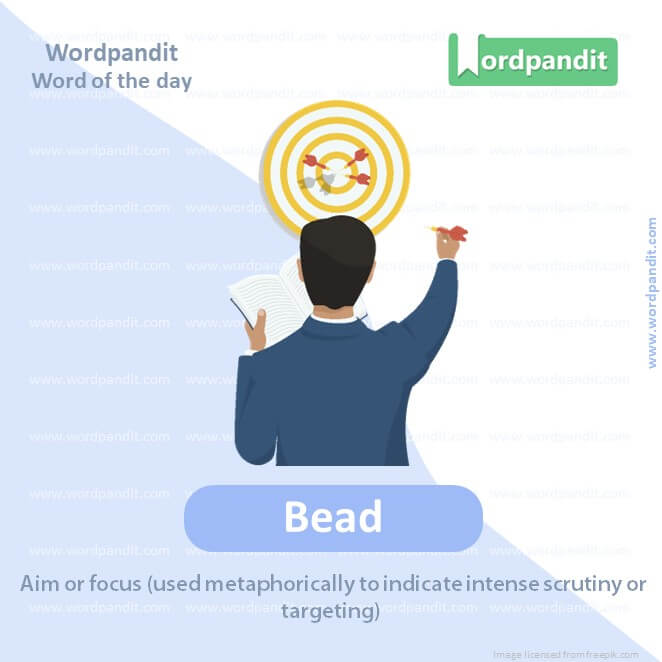
WORD-1: BEAD
CONTEXT: The Hawaiian lei is a symbol of aloha, the word for love, hello and goodbye in the Hawaiian language. Beads made from shells, seeds, bone, and ivory are strung together to create a necklace that embodies the spirit of aloha.
SOURCE: The Times of India
EXPLANATORY PARAGRAPH: Imagine you have a tiny, shiny round thing that you can put on a string to make jewellery like necklaces or bracelets. That’s a bead! People use beads to make their jewellery pretty and colourful.
MEANING: Aim or focus (used metaphorically to indicate intense scrutiny or targeting) (noun).
PRONUNCIATION: bee-d
SYNONYMS: orb, pellet, ball, pearl, sphere, bauble, droplet
USAGE EXAMPLES:
1. She threaded the beads onto a string to make a bracelet.
2. The dress was decorated with tiny blue beads.
3. Each bead on his necklace told a story from his travels.
4. Children were making patterns with colorful beads.
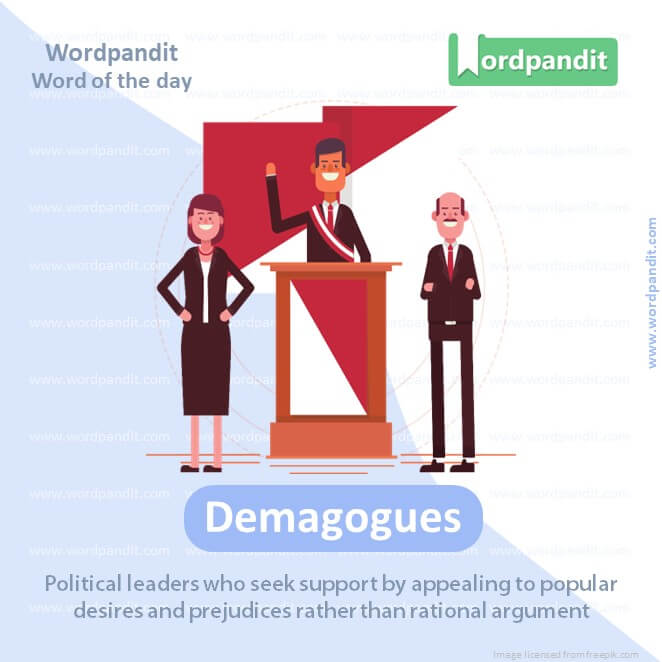
WORD-2: DEMAGOGUES
CONTEXT: Different parts across the globe are witnessing the rise of demagogues who exploit the fears and anxieties of the people for their political benefits, posing a grave threat to democracy.
SOURCE: Indian Express
EXPLANATORY PARAGRAPH: Imagine a person who tries to make people like them by saying things that sound good, but they’re not really true or fair. They try to get more power by making people feel strong feelings like fear or hope. That’s what a demagogue does.
MEANING: Political leaders who seek support by appealing to popular desires and prejudices rather than rational argument (noun).
PRONUNCIATION: dem-uh-gogs
SYNONYMS: agitator, rabble-rouser, firebrand, instigator, provocateur, inciter, fomenter
USAGE EXAMPLES:
1. The city has seen its share of demagogues trying to exploit the people’s fears.
2. History is full of demagogues who have misled people for their own benefit.
3. Many believe that demagogues are dangerous for democracy.
4. Some politicians become demagogues to gain quick popularity.
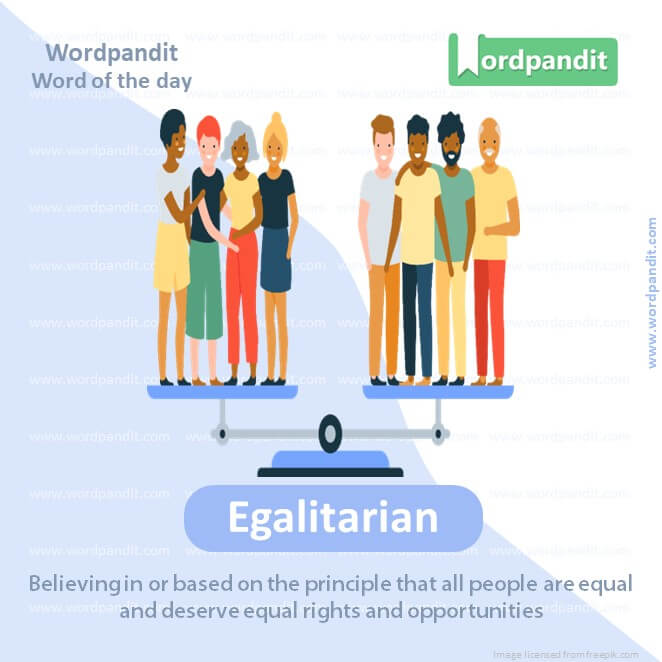
WORD-3: EGALITARIAN
CONTEXT: The founding fathers of the Indian Constitution believed in creating an egalitarian society where there was no discrimination based on caste, creed or religion.
SOURCE: Hindustan Times
EXPLANATORY PARAGRAPH: Imagine a big seesaw where everyone, no matter how big or small, gets to sit and it always stays balanced. Egalitarian is like that. It means that everyone should be treated the same and have the same chances, no matter who they are.
MEANING: Believing in or based on the principle that all people are equal and deserve equal rights and opportunities (adjective).
PRONUNCIATION: e-guh-li-tehr-ee-an
SYNONYMS: equal, fair, impartial, even-handed, unbiased, non-discriminatory, equitable
USAGE EXAMPLES:
1. The organization has an egalitarian approach to employment.
2. She’s an egalitarian and believes in equal rights for all.
3. The group promoted egalitarian values in their community.
4. The school’s egalitarian policy ensures everyone has the same opportunities.
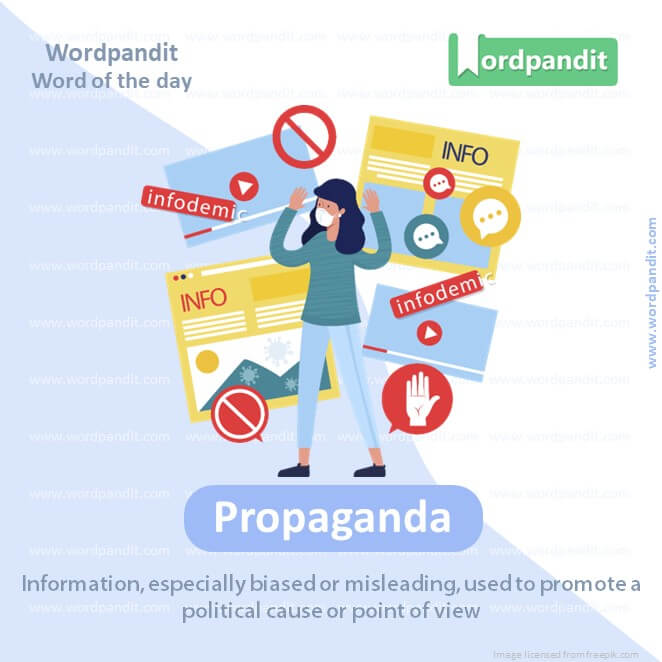
WORD-4: PROPAGANDA
CONTEXT: The role of propaganda in shaping public opinion and pushing specific political agendas has gained prominence, particularly in the digital era.
SOURCE: The Economic Times
EXPLANATORY PARAGRAPH: Imagine if someone keeps showing you pictures and stories to make you think a certain way, even if it’s not the whole truth. That’s propaganda. It’s like when someone tries to convince you of something by showing and telling things in a certain way.
MEANING: Information, especially biased or misleading, used to promote political cause or point of view (noun).
PRONUNCIATION: pro-puh-gan-duh
SYNONYMS: brainwashing, spin, publicity, hype, disinformation, indoctrination, promotion
USAGE EXAMPLES:
1. The government was accused of spreading propaganda.
2. Many wartime posters were a form of propaganda.
3. The film was pure propaganda, promoting a biased viewpoint.
4. Children should be taught to recognize propaganda when they see it.
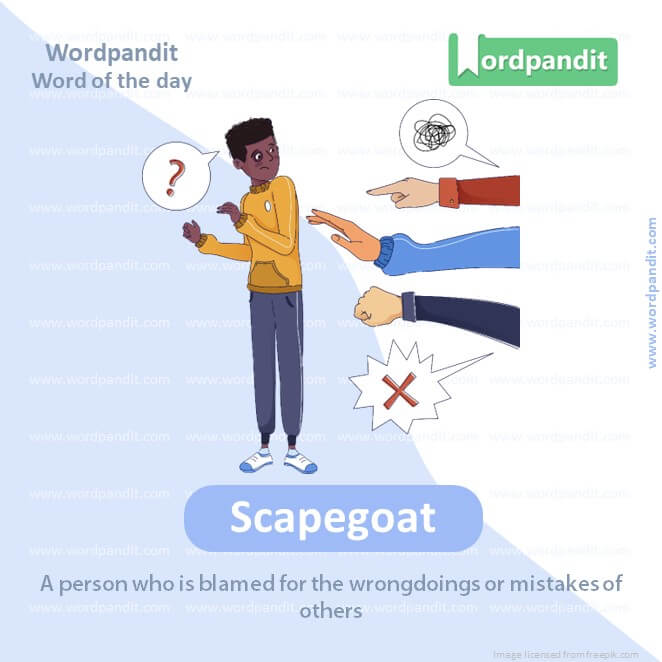
WORD-5: SCAPEGOAT
CONTEXT: Often in times of societal unrest, a specific group becomes a scapegoat, bearing blame for circumstances they did not cause.
SOURCE: Mint
EXPLANATORY PARAGRAPH: Imagine if something goes wrong and everyone blames one person, even if it wasn’t all their fault. That person being blamed is like a “scapegoat”. It’s when someone is blamed for something that might not be entirely their fault.
MEANING: A person who is blamed for the wrongdoings or mistakes of others (noun).
PRONUNCIATION: skayp-goht
SYNONYMS: fall guy, victim, target, whipping boy, patsy, dupe, stooge
USAGE EXAMPLES:
1. The manager was made a scapegoat for the company’s failures.
2. Often, in times of war, minority groups become scapegoats for larger societal problems.
3. The team’s goalie became the scapegoat for the loss.
4. Politicians often look for scapegoats rather than accepting their own mistakes.
WORD-6: CONFLATION
CONTEXT: There is a growing trend of conflation observed where disagreement with government policies is being termed as unpatriotic, blurring the line between patriotism and criticism of the government.
SOURCE: The Times of India
EXPLANATORY PARAGRAPH: Imagine you have two boxes of toys. If you pour all the toys from both boxes into one big box, you mix them together. Conflation is a bit like that. It’s when you mix two different things together, so it’s hard to tell them apart.
MEANING: The merging or mixing together of two different ideas or things into one (noun).
PRONUNCIATION: kuhn-flay-shu
SYNONYMS: blending, merging, amalgamation, fusion, integration, combination, mixture
USAGE EXAMPLES:
1. The article made a conflation of love and attraction.
2. There’s often a conflation of education and school, but they’re not always the same thing.
3. The conflation of myth and fact in the story made it even more intriguing.
4. He made a conflation of two different events, causing confusion.
WORD-7: SPAWNED
CONTEXT: India’s technological boom has spawned numerous startups that are addressing various socio-economic issues, from education to healthcare.
SOURCE: Indian Express
EXPLANATORY PARAGRAPH: Imagine a fish laying lots of tiny eggs in the water. Those tiny eggs are called spawn. When we say something “spawned”, it’s like saying something started or caused other things to happen, just like those fish eggs will become new fish.
MEANING: To produce or give rise to, especially in large numbers (verb)
PRONUNCIATION: spawnd
SYNONYMS: generate, create, produce, provoke, induce, give rise to, lead to
USAGE EXAMPLES:
1. The movie spawned a series of sequels.
2. The invention of the smartphone spawned many new industries.
3. The movement spawned a new way of thinking about environmental issues.
4. The popular book spawned a television series and merchandise.
WORD-8: ROBUST
CONTEXT: India’s economy exhibited robust growth despite the global economic slowdown, attributing to favorable government policies and domestic consumption.
SOURCE: The Economic Times
EXPLANATORY PARAGRAPH: Imagine a really strong, sturdy tree that can stand tall during a big storm. “Robust”
is a word that’s a bit like that. It means something is strong, healthy, and not easily broken or defeated.
MEANING: Strong, healthy, and hardy in constitution (adjective).
PRONUNCIATION: roh-buhst
SYNONYMS: sturdy, durable, strong, resilient, tough, hearty, solid
USAGE EXAMPLES:
1. The system is robust and can handle many users at once.
2. We need a robust strategy to tackle these challenges.
3. The athlete showed a robust performance in the competition.
4. The country has a robust economy, despite global challenges.
WORD-9: REUNIFICATION
CONTEXT: The reunification of the two Koreas has been a significant diplomatic challenge for several decades, as a peaceful reunification would require political, economic, and societal consensus from both sides.
SOURCE: Hindustan Times
EXPLANATORY PARAGRAPH: Imagine two puzzle pieces that were once together but got separated. When you put them back together, they become one again. “Reunification” is like that. It’s when two things or groups that were apart come back together.
MEANING: The process or act of bringing two separated parts back together (noun).
PRONUNCIATION: ree-yoo-nuh-fi-kay-shun
SYNONYMS: reunion, merging, restoration, integration, reintegration, unification, consolidation
USAGE EXAMPLES:
1. The reunification of the two countries was a historic event.
2. Many families hoped for reunification after the war.
3. The conference discussed the potential reunification of the separated regions.
4. The reunification process took several years and was not without challenges.
WORD-10: TRUNCATED
CONTEXT: The government’s announced relief package for the small and medium enterprises was truncated due to higher than expected inflation and instability in the global markets.
SOURCE: Mint
EXPLANATORY PARAGRAPH: Imagine you have a long pencil and you chop off a bit from the top, making it shorter. That’s like “truncated”. It means something has been shortened or cut off, especially when a part of it is missing.
MEANING: Shortened or cut off, especially by having a part removed (adjective/verb).
PRONUNCIATION: truhn-kay-ted
SYNONYMS: shortened, cut off, abbreviated, abridged, clipped, condensed
USAGE EXAMPLES:
1. The meeting was truncated due to an unexpected event.
2. The truncated version of the book was easier for kids to read.
3. We received a truncated message and couldn’t understand its full meaning.
4. The movie felt truncated, leaving many questions unanswered.
Vocabulary Daily Use Words
In the architecturally diverse world of language learning, ‘vocabulary daily use words’ act as a cornerstone. We often take these words for granted, but their significance in day-to-day communications is nothing short of monumental. Mastering these ‘vocabulary daily use words’ should be more than an ancillary task on the sideline; it should take the center stage in your language learning journey.
To begin with, approach ‘vocabulary daily use words’ with the same gusto and reverence as you would an untapped treasure chest. Go beyond the conventional realm of textbooks and explore the world of contemporary literature, newspapers, and digital content. By immersing yourself in these mediums, you’re aligning your learning with real-world language usage, thereby gaining a practical understanding of ‘vocabulary daily use words.’
Memory-enhancing tools add an extra layer of effectiveness to your learning. Flashcards, for example, are a great way to make your study sessions interactive and memory-forging. Coupled with the Leitner system, which is a principle of spacing and repetition, you can ensure better recall and understanding of ‘vocabulary daily use words.’
Furthermore, leveraging mnemonic devices aids in etching the ‘vocabulary daily use words’ into your memory. Associating common words with unique and memorable narratives in your mind enhances their recall. Regular revision and using these words in routine conversations further cement your proficiency.
The potency of immersion as a language learning strategy cannot be emphasized enough. Conversing with native speakers, if possible, provides context to ‘vocabulary daily use words’ and boosts your fluency.
In conclusion, mastering the ‘vocabulary daily use words’ is an enriching journey that requires ongoing effort, continual exposure, and hands-on practice. The strategy of learning through various mediums, using memory-enhancing techniques, leveraging mnemonic devices, and immersion can help demystify these words and enhance your overall language proficiency. So, gear up and embrace the linguistic adventure of mastering the ‘vocabulary daily use words.’













